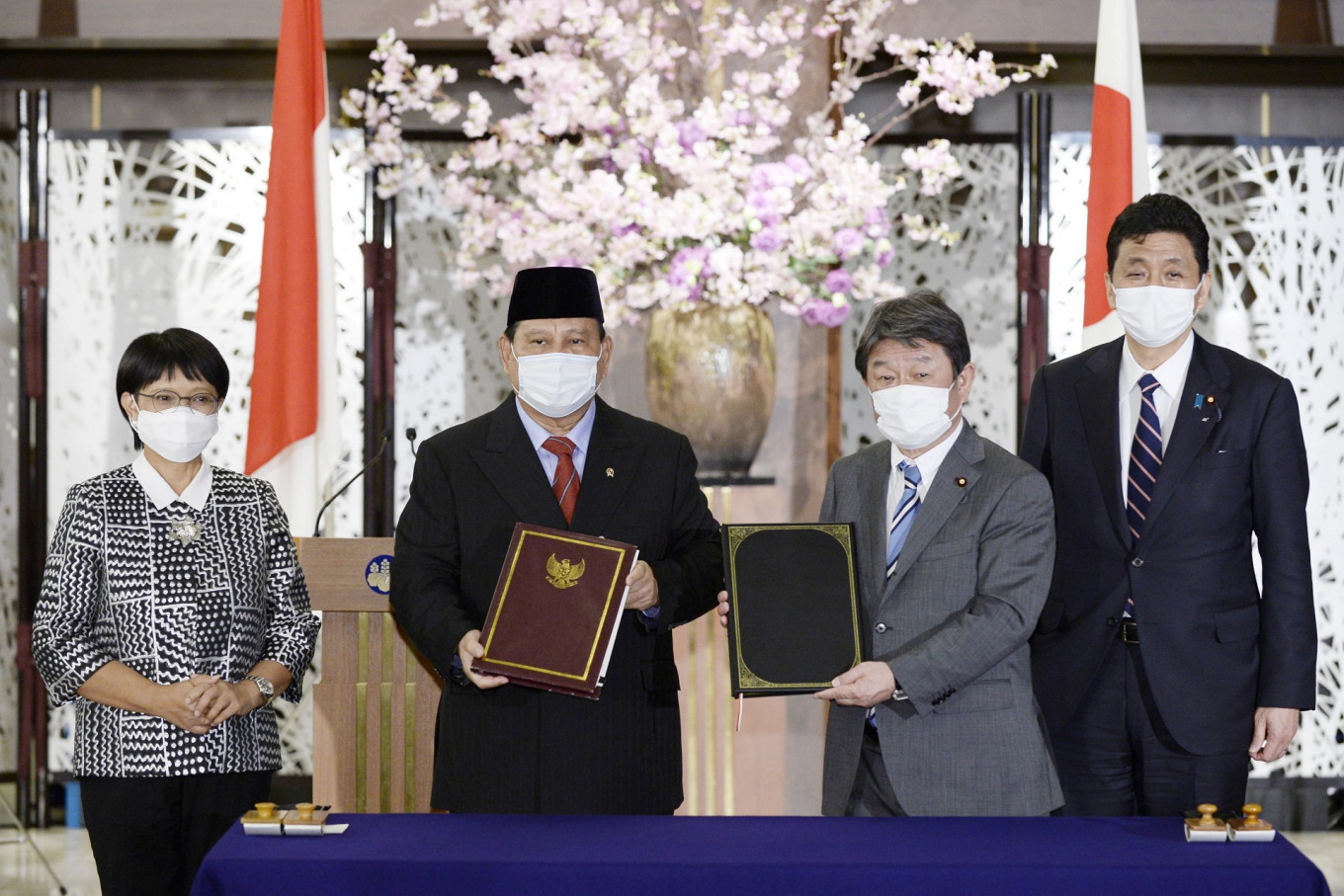www.aljazeerah.info
Opinion Editorials, June 2021
Archives
Mission & Name
Conflict Terminology
Editorials
Gaza Holocaust
Gulf War
Isdood
Islam
News
News Photos
Opinion Editorials
US Foreign Policy (Dr. El-Najjar's Articles)
www.aljazeerah.info
Japanese-Indonesian Promotion of Multilateralism in the ASEAN Countries By Kanasugi Kenji June 6, 2020 |
 |
|
| Indonesian and Japanese foreign and defense ministers, May 31, 2021 The Jakarta Post |
Promoting multilateralism, together with Indonesia
When it comes to diplomatic strategy, Japan has long emphasized the importance of a multilateral approach. As we face increasingly complex challenges with the COVID-19 pandemic, we must come together to address them through multilateral coordination and collaboration and strive for a united world.
Japan is no stranger to the multilateral diplomacy. Take for example the Asia-Pacific Economic Cooperation (APEC), a forum that brings together 21 economies in the Pacific Rim to promote free trade in the region.
Japan founded the idea and was instrumental in its creation. The original concept of APEC goes back to the Pacific Basin Initiative proposed by a former prime minister of Japan, Ohira Masayoshi, in 1978. The then-Australian prime minister, Malcom Fraser, embraced and developed Ohira’s initiative and later, in 1989, Australia hosted the first APEC ministerial meeting.
APEC, as we know it today, has evolved into a powerful vehicle for promoting free trade in the region. Notably, Indonesia has played an important role in this transformation. Indonesia has hosted the APEC summit meetings twice and was pivotal in forging the Bogor Declaration in 1994, in which all APEC economies agreed to specific timelines for trade liberalization in the region. APEC is just one example of Japan’s effort to promote multilateral cooperation.
The key principle underlying these efforts is our firm belief that only a rules-based, free and open international order — not force or coercion — can bring about peace and prosperity in the region and the world. This vision held by Japan for our future has wide support among ASEAN countries, as well as in the United States, Australia, India and the European Union.
As part of its effort, Japan has promoted a vision for the Indo-Pacific region: a rules-based free and open Indo-Pacific (FOIP). With this vision in mind, Japan is advancing such principles and values as the rule of law, freedom and openness that we aspire to, and is striving to ensure that these values take root in the region. We believe these values to be fundamental for every country that wants to enjoy peace and prosperity. On the ASEAN front, Indonesia took leadership in producing the ASEAN Outlook on the Indo-Pacific (AOIP) in 2019.
On every occasion, Japan has reiterated its full support for AOIP. Last year, Japan and ASEAN together affirmed that the FOIP and AOIP share fundamental principles and decided to reinforce partnership through enhanced practical cooperation and synergy in the four areas as outlined in the AOIP, namely, maritime cooperation, connectivity, United Nations Sustainable Development Goals 2030 and economic and other possible areas of cooperation.
The expansion of free and fair economic zones that Japan has been promoting supports these same goals. In recent years, Japan has been a flag bearer of free trade through its conclusion of a number of trade agreements.
After the United States withdrew from the Trans-Pacific Partnership (TPP), which originally encompassed 12 APEC economies that signed an advanced trade agreement for the 21st century, Japan exerted its leadership to bring the agreement into force with the remaining 11 countries as the Comprehensive and Progressive Trans-Pacific Partnership (CPTPP).
Indonesia has also been instrumental in promoting free trade in the region. In particular, as the chair of the Trade Negotiating Committee, Indonesia, together with Japan, has closely coordinated and led successful negotiations of the Regional Comprehensive Economic Partnership (RCEP) among ASEAN, Australia, China, Japan, New Zealand and the Republic of Korea. In the face of new challenges, however, some may ask: Is authoritarianism more successful than democracy in bringing the COVID-19 pandemic under control? I beg to differ.
A democratic society is one where each and every person can achieve their maximum potential and where freedom, ingenuity, and creativity, as well as diversity and basic human rights are all respected. These are the kinds of societies that will bring happiness and prosperity to all individuals and be the foundation to creating even more resilient societies.
Japan and Indonesia are two of the largest democracies in the world. As strategic partners, our two countries have enormous potential for cooperation. We must together strive for a healthy multilateralism that will last into the future.
***
The writer is Ambassador of Japan to Indonesia.
https://www.thejakartapost.com/academia/2021/05/30/promoting-multilateralism-together-with-indonesia.html.
***
Share the link of this article with your facebook friends
|
|
|
|
||
|
||||||


